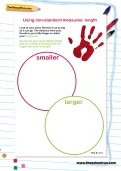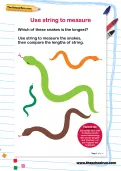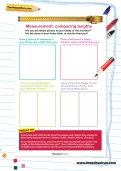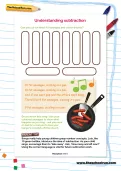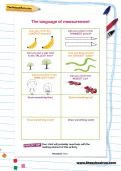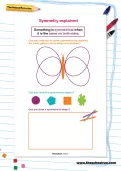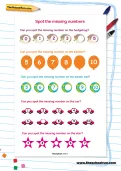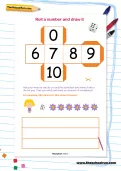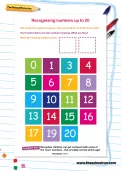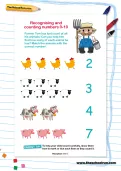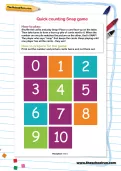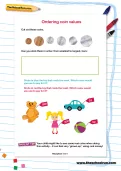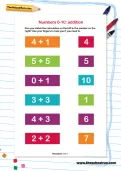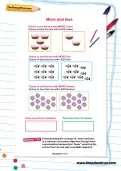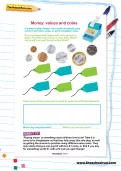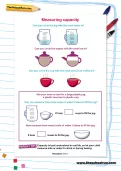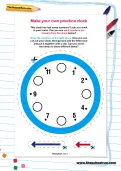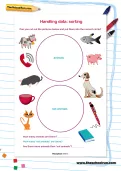Eyfs Maths worksheets
Free worksheets: Weights and measurements, EYFS, Reception
You’ll need to login or Register first to access these worksheets for free.
Once you’ve tried out our free worksheets, why not explore all our resources (1000s of worksheets, interactive tutorials, learning packs and more) with a 14-day FREE trial subscription.
Using non-standard measures: length
Let's get measuring. Look at your hand. Stretch it out as big as it can go. The distance from your thumb to your little finger is called your hand span. Go around your house finding things that are smaller and things that are larger than your hand span. Write them in these circles.
Use string to measure
This practical and fun activity will enable your child to measure the snakes with string and compare the lengths using mathematical language.
Measurement: comparing lengths
Are you the tallest person in your family or the shortest? Are the items in your home taller or shorter than you? Let's do some measuring to find out!
Understanding subtraction
Can you cut out these 10 sausages and colour them in? Do you know this song? Use your coloured sausages to show what happens as you sing – ask you mum or dad for a real pan to toss your bangers in (safely off the stove!).
The language of measurement
Can you find the longest, thinnest, tallest, smallest or widest? Then see if you can draw something long, thin, small and wide.
Symmetry explained
Something is symmetrical when it is the same on both sides. Can you make this butterfly symmetrical by drawing the same patterns on its wings on both sides?
Spot the missing numbers
This is a Reception maths worksheet on spotting the missing number, created by a primary school teacher to be used at home or in the classroom.
Can you spot the missing number on the hedgehog, the balloon, the beach ball and the car? What about on the star?
Can you spot the missing number on the hedgehog, the balloon, the beach ball and the car? What about on the star?
Sharing objects into equal groups
Cut out these dolls, cars and sweets. Can you share them between you and your mum or dad? Say “one for me, one for you” as you hand them out!
Roll a number and draw it
Ask your mum or dad to cut out this template and make it into a die for you. Can you roll it and draw an amount of something? For example, Ella rolled a 6. She drew 6 flowers.
Recognising numbers up to 20
Cut out all the number squares. Can you put them in order from 0-20? You’ll notice there are two numbers missing. What are they? Write the missing numbers down.
Recognising numbers memory game
Turn all the cards face down. Each player takes a card and tries to find its number or picture match. If they do they keep the cards; if they don’t they place them back in the same place. The winner is the player with all the cards at the end.
Recognising and counting numbers 0-10
Farmer Tom has lost count of all his animals! Can you help him find how many of each animal he has? Match the animals with the correct number!
Reading numbers 0 to 10
This number snake has lost all his colours, can you help? Which number isn't coloured in?
Quick counting Snap game
Shuffle the cards and play Snap! Place a card face-up on the table. Then take turns to form a face-up pile of cards next to it. When the number on one pile matches the picture on the other, that’s SNAP! The player who says “snap” first keeps the cards. Keep playing until one player has all the cards – they win!
Properties of numbers quiz
Cut this sheet so that you, the parent, have the questions and your child has the blank answer sheet. Read the questions and ask your child to write the answers down. When they’ve finished, check their answers and discuss any numbers they got stuck on.
Play dice numbers
Ask your mum or dad to play some real dice games with you, then match up these dice numbers and digits. Now throw a real dice12 times. Record all the numbers here. Can you draw the dice numbers and write the digits?
Ordering coin values
Cut out these coins then stick them in order, from smallest to largest. Circle in blue the toy that costs the most. Which coins would you use to pay for it? Circle in red the toy that costs the least. Which coins would you use to pay for it?
Numbers 0-10: addition
Can you match the calculation on the left to the number on the right? Use your fingers to help you if you need to.
More and less
Do you know what ‘more and less’ mean? Colour in red the box with MORE cakes. Colour in blue the box with LESS cakes.
Money: values and coins
It’s time to play shops! You could use plastic play coins if you have some, or print out paper ones. Cut out these blank labels and write prices on them. Put them onto some of your toys. Which coins will you need to use to buy them?
Measuring capacity
Can you circle the jug with the most water in? Which teapot has more tea in it? Then get a large plastic jug of water and see if you can work out how many cups of water are in it.
Telling the time: Make your own clock
This clock has lost some numbers! Look at a clock in your home. Can you see what numbers are missing from the clock below? Draw the numbers in the right place. Now you can cut out your clock, the big hand and the little hand and put it together with a clip. Can you move the hands to show different times?
Handling data: sorting
Can you cut out the pictures below and put them into the correct circle and then answer the questions.
